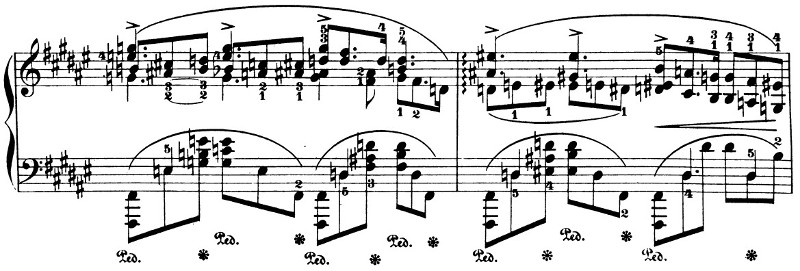Exhaustion
(Sarcasm is OFF for this post.)
Lately I’m finding it too exhausting to write about the endless insanity of the seemingly undying narrative around the Worst Disease Ever. There are signs of tiny cracks in the wall of propaganda, but the change is so slow that I’m now convinced that I won’t live long enough to see the return to sanity. Just when I think things are getting better, some new pack of lies gets pushed out in the mainstream media (raccoon dogs!), or we get some new distraction to keep us from thinking too hard (Ukraine! UFOs! J6!).
Lately I’ve been spending more time at the piano. There, at least, there is only the hard truth: the genius of the great composers, my utter lack of talent, and the hopelessness of the task. My latest foolhardy attempt is the Barcarolle, Op. 60, by Chopin. This is a ridiculously difficult piece, and I’m a fool for trying to learn to play it. Just being able to get my fingers on the notes at half speed will take at least a year, if not longer. But I have loved this piece for years, ever since I first heard it, and as we all know so well, love is often blind.
The task is made even more formidable by the existence of so many great recordings by great pianists. Here is one such recording by Krystian Zimmerman:
What makes this video so inspiring and yet so depressing is that Zimmerman makes it all look so easy. But a glance at just one tiny section of this great piece of music will show how misleading this ease can be:

The day I started working on this piece, I decided to do something different, and work backwards from the end. That’s because the last three pages, including the più mosso section (at around 7 minutes in the Zimmerman video above), are perhaps the hardest pages. I figured that once I learned the piece, at least the ending might not sound as bad at the rest, so that any unfortunate listeners might forget the earlier flubs.
So on that first day, I got to the section of the music shown above, and was stunned by how impenetrable it seemed. It’s bad enough that the piece is in F sharp, with six sharps in the key signature. Then you have to figure out all of the accidentals in this section, and then try to figure out if you’re doing the right thing, because when played slowly, it sounds terribly modern and dissonant.
It took me 15 minutes to get through these two measures on that first day. Now, after several weeks of work, I can get through that bit in about 15 seconds. That sounds like a great improvement, but it’s still far too slow, and eventually I’ll have to memorize it, because there’s no way I can sight read stuff like this at full speed.
But the strange thing is that all this seemingly hopeless work is actually fun. There’s something engaging about a challenge like this, especially when the music is so beautiful and rewarding. The più mosso section even sounds OK at quarter speed if I can manage to hit the right notes. (It’s important always to play slowly enough that you don’t make mistakes; otherwise, you’re just practicing the mistakes.)
This kind of work is one of the few things that keeps me going right now. It’s lonely work, because the insanity around the Worst Disease Ever has almost completely destroyed the social aspect of my musical life. Thank goodness for videos of great pianists!
And speaking of which, here are two great pianists talking about the Barcarolle. Both of them are in agreement with me that this may be the best thing Chopin wrote, which is saying a lot.